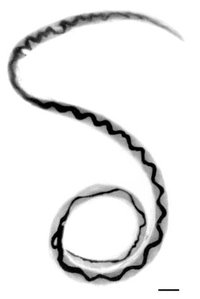
Photo from wikipedia
The gray field slug, Deroceras reticulatum, is a key pest of seed crops. There is an increasing interest in developing new chemical controls due to limited management options. Essential oils,… Click to show full abstract
The gray field slug, Deroceras reticulatum, is a key pest of seed crops. There is an increasing interest in developing new chemical controls due to limited management options. Essential oils, being non-toxic to humans and exempt from pesticide registration and residue tolerance requirements under US federal law (Sect. 25(b) of the Federal Insecticide, Fungicide, and Rodenticide Act), could be safe and easily implementable alternatives. In this study, the most toxic essential oils to D. reticulatum adults of 13 plant-derived essential oils and one synthetic toxin (caffeine) were determined based on Lethal Concentration 50 values produced in a laboratory Petri dish bioassay. Thyme, spearmint, and pine oil were the most lethal, causing 50% mortality of D. reticulatum at concentrations of 0.148, 0.153, and 0.176% (v/v), respectively. Thyme and spearmint oil were then tested in a greenhouse microcosm experiment and a separate phytotoxicity assessment. In the greenhouse, slugs were added to containers planted with annual ryegrass (Lolium multiflorum) and the containers were sprayed with either 0.5% (v/v) essential oil emulsion, Slug-Fest (industry standard molluscicide), surfactant control at 1% (v/v), or water control. Both oils caused 97.5% mortality of slugs, performing comparably to metaldehyde. Phytotoxic effects were assessed by spraying oils on seedlings and adult plants of two cultivars each of perennial ryegrass (Lolium perenne) and tall fescue (Festuca arundinacea). No definitive signs of phytotoxicity were observed upon visual inspection, and there were no differences in chlorophyll content or biomass between treated and untreated plants.
Journal Title: Journal of Pest Science
Year Published: 2019
Link to full text (if available)
Share on Social Media: Sign Up to like & get
recommendations!